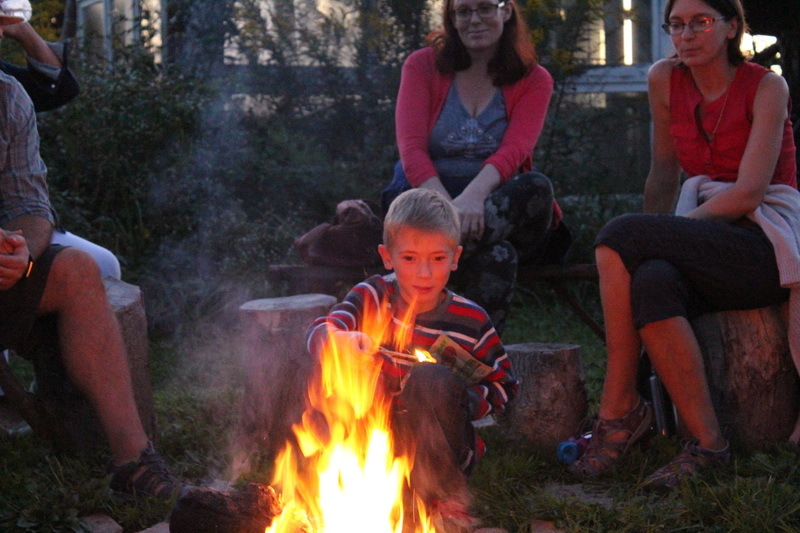“The Earth, the air, the fire, the water, return, return, return, return,” this chant calls for us to focus on the elemental forces of nature. Few events are more elemental than gathering around a fire with the chill in the air on a fall evening. Little feeds us more easily or more deeply than such connection.
After a puppet show last Saturday, we gathered for a pot-luck meal and a fire circle. The air was clear, fresh and slightly cool. The sliver of the moon sank low in the sky. A dome of stars appeared above us; the Milky Way faintly visible. The fire's glow illuminated our faces. A young boy and girl roasted marshmallows and stuck the ends of their sticks into the embers. Above the drone of crickets chirping, we heard boys calling and the rumble of a little red wagon as they pulled each other around the farm.
A friend commented, “This is so grounding.” The warmth of the fire and the warmth of our spirits seemed to intertwine. In past years, some sang solos boldly. This year, we began singing rounds softly, our voices blending together, as if we were humbly embracing our shared humanity after another week of devastating news. We began as acquaintances; by the end of evening, we felt our hearts as one.
Our ancestors shared stories and song around the fire as darkness and cold dominated their lives every winter. Their lives had an essential rhythm that wove them closely with nature: they sowed seeds in spring, tended crops in summer; harvested in fall and rested in winter.
Now, however, central heating, indoor plumbing, electricity and refrigeration make it so easy for us to stay inside in relative comfort summer and winter. We no longer feel the extremes of summer and winter, but we now seldom savor the juiciness of a really ripe tomatoes; nor do we feel the bite of winter nor the warmth of friends sharing around an open fire. We simply go to the store to buy food, without touching, smelling or tasting the rich life of a garden.
In the response to the devastation in Puerto Rico from Hurricane Maria, we see an elemental struggle: people are searching desperately to find water fit to drink. Tons of food sit in containers at the port. The electrical grid has been destroyed; there is limited phone service. Truck drivers cannot be reached; diesel fuel is scarce; many of the roads are impassable.
It's time to return to basics: to restore the intimate web of life. World-class gardener Alan Chadwick said that no agriculture should be so large that it is beyond the reach of a man's hands. He promoted, “oikosnomia.” the origin of our word, “economics:” to manage one's farm to promote the maximum benefit for the farm itself. One builds fertility, and encourages complexity and diversity—a process that builds resilience. That approach is now needed on a massive scale.
Rudolf Steiner, the founder of biodynamic agriculture, said that as much as possible, a farmer should work to keep the farm a self-contained entity—to provide most of its needs from the farm itself.Animals produce manure which then fertilizes the fields. It is a cycle that builds fertility and resilience, an approach that builds intimacy with nature one farm at a time, one person at a time.
Such an approach reminds me of another song written by Shlomo Carlbach: Return again, return again, return to the land of your soul, return to who you are, return to what you are, return to where you are, born and reborn again.
We humans are enmeshed in a web of connection with life itself. As my friend, Gwen, said this morning, “I fill my eyes with the land every day.” Let's find ways to fill ourselves with nature.

